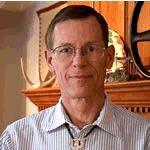 William B. Provine
William B. Provine
The historian of science William B. Provine died on September 1, 2015, at the age of 73, according to a Facebook post from his wife. A specialist in the history of population genetics, his books included The Origins of Theoretical Population Genetics (1971), Sewall Wright and Evolutionary Biology (1986), and a collection of Sewall Wright's papers (1986) with his explanatory introductions. In a memoir published in Isis in 1999, he explained that in his view, a student working on the history of biology "should be as familiar with the science as any doctoral student"; for his own part, he added, "I am very happy to move between history and science."
Provine was a vocal and persistent opponent of creationism. He wrote thoughtfully on evolution and creationism, e.g. in his essay on "Evolution, Religion, and Science" in The Oxford Handbook of Religion and Science (2006), but he was perhaps most famous for his views on the connection between evolution and atheism. He once asserted, "As the creationists claim, belief in modern evolution makes atheists of people" — a consequence that he welcomed. His views were formed in graduate school, where, he related in his memoir, "[a]fter reading [Theodosius] Dobzhansky several times and listening to [Lynn] Throckmorton, my belief in purposive nature disappeared for good." He was eager to share his views. Starting in 1986, he taught a class at Cornell University where students were exposed to creationism along with evolution, and he was often willing to debate creationists, including his regular opponent the "intelligent design" proponent Phillip Johnson. As a result of his prominence, he was often cited by creationists eager to portray his views on the connection between evolution and atheism, or a caricature thereof, as representative of scientists in general. He was among the scholars interviewed, under false pretenses, for the creationist propaganda film Expelled (2008).
Provine was born on February 19, 1942, in Nashville, Tennessee. He attended the University of Chicago, where he received his B.S. in mathematics in 1962, his M.A. in the history of science in 1965, and his Ph.D. in the history of science in 1970. His academic career was mainly spent at Cornell University, where he became a professor of history and of biology. His honors included fellowship in the American Association for the Advancement of Science, a Guggenheim Fellowship in 1985, and the inaugural David L. Hull Prize from the International Society for History, Philosophy, and Social Studies of Biology in 2011.
